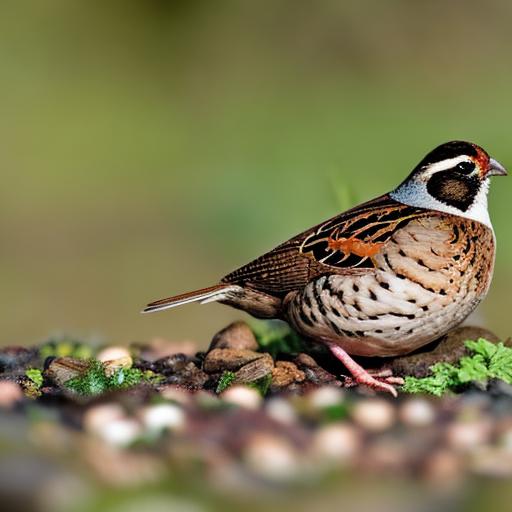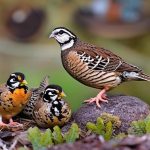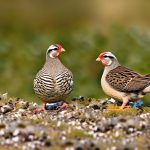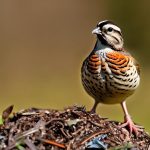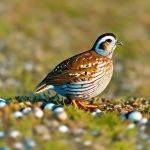Keeping quail in the garden can be a rewarding and enjoyable experience for many reasons. Quail are small, low-maintenance birds that can provide fresh eggs, pest control, and entertainment for gardeners. They are also relatively quiet and can be kept in smaller spaces compared to other poultry, making them an ideal choice for urban or suburban gardeners. Additionally, quail are known for their gentle nature and can be a great addition to a family garden, providing an educational experience for children and adults alike.
Quail are also known for their ability to forage for insects and weed seeds, which can help to naturally control pests in the garden. Their small size and gentle nature make them easy to handle and care for, making them an ideal choice for those who are new to keeping poultry. With the right knowledge and preparation, keeping quail in the garden can be a fulfilling and sustainable way to produce fresh eggs and contribute to a healthy ecosystem.
Key Takeaways
- Quail are a great addition to any garden, providing entertainment and fresh eggs.
- Consider the space and climate of your garden when choosing the right quail species.
- Provide a safe and comfortable habitat for quail with proper shelter and protection from predators.
- Feed quail a balanced diet and provide clean water to ensure their health and well-being.
- Protect quail from predators and pests by using fencing, netting, and other deterrents.
Choosing the Right Quail Species for Your Garden
When it comes to keeping quail in the garden, it’s important to choose the right species that will thrive in your specific environment. There are several species of quail that are commonly kept in gardens, each with its own unique characteristics and requirements. The most popular species for gardeners include the Japanese quail (Coturnix japonica), the Bobwhite quail (Colinus virginianus), and the California quail (Callipepla californica).
Japanese quail are known for their small size, high egg production, and adaptability to a variety of climates, making them a popular choice for gardeners. Bobwhite quail are native to North America and are known for their distinctive call and ability to thrive in grassy habitats, making them a good choice for gardens with ample space. California quail are known for their striking appearance and sociable nature, making them a great choice for gardeners who want to enjoy watching their quail interact with each other.
When choosing the right quail species for your garden, it’s important to consider factors such as climate, space, and personal preferences. Researching the specific needs and characteristics of each species will help you make an informed decision that will ensure the health and happiness of your quail in the garden.
Creating a Safe and Comfortable Habitat for Quail
Creating a safe and comfortable habitat for quail in the garden is essential for their well-being and productivity. Quail require a secure enclosure that protects them from predators and provides them with ample space to roam and forage. A well-designed quail habitat should include a sturdy coop or aviary with proper ventilation, predator-proof fencing, and access to fresh water and shade.
The coop or aviary should be spacious enough to allow the quail to move around freely and engage in natural behaviors such as dust bathing and foraging. Providing a variety of perches, hiding spots, and nesting boxes will also help to create a stimulating environment for the quail. Additionally, it’s important to provide a substrate such as straw or wood shavings on the floor of the enclosure to absorb moisture and provide a comfortable surface for the quail to walk on.
In addition to the physical environment, it’s important to consider the social dynamics of the quail flock when creating their habitat. Quail are social birds that thrive in groups, so it’s important to provide enough space and resources to prevent overcrowding and competition. By creating a safe and comfortable habitat for quail in the garden, you can ensure that they will be healthy, happy, and productive members of your garden ecosystem.
Feeding and Caring for Quail in the Garden
Feeding and caring for quail in the garden requires attention to their specific dietary needs and daily care routines. Quail are omnivorous birds that require a balanced diet of commercial quail feed, fresh greens, insects, and grit. Providing access to a high-quality commercial quail feed that is specifically formulated for their nutritional needs is essential for their health and egg production.
In addition to commercial feed, quail should be offered a variety of fresh greens such as lettuce, spinach, and kale to supplement their diet with essential vitamins and minerals. They also require access to grit, which helps them digest their food by grinding it in their gizzards. Insects such as mealworms or crickets can also be offered as a protein-rich treat that mimics their natural diet in the wild.
Caring for quail in the garden also involves daily tasks such as checking for eggs, refilling water and feed containers, and monitoring their health and behavior. It’s important to observe the quail regularly to ensure that they are active, alert, and free from signs of illness or injury. Providing regular dust baths, trimming their nails if necessary, and keeping their living environment clean are also important aspects of caring for quail in the garden.
By providing a balanced diet, regular care, and attention to their specific needs, you can ensure that your quail will be healthy, happy, and productive members of your garden ecosystem.
Dealing with Predators and Pests
Dealing with predators and pests is an important aspect of keeping quail in the garden, as they can pose a threat to the safety and well-being of the birds. Common predators of quail include foxes, raccoons, cats, dogs, birds of prey, and snakes. It’s important to take proactive measures to protect your quail from these predators by securing their enclosure with sturdy fencing, burying wire mesh around the perimeter to prevent digging, and installing predator-proof locks on doors and windows.
In addition to predators, quail can also be susceptible to pests such as mites, lice, and worms. Regularly inspecting the quail for signs of pests such as feather loss, irritation, or lethargy can help you identify and treat infestations early on. Providing regular dust baths with diatomaceous earth or wood ash can help prevent pests by suffocating them and drying out their eggs.
It’s also important to keep the surrounding garden area free from potential hiding spots for predators such as tall grass, brush piles, or overgrown vegetation. By maintaining a clean and well-kept garden environment, you can reduce the risk of predators lurking near the quail enclosure.
By taking proactive measures to protect your quail from predators and pests, you can ensure that they will be safe and secure in their garden habitat.
Breeding and Raising Quail Chicks in the Garden
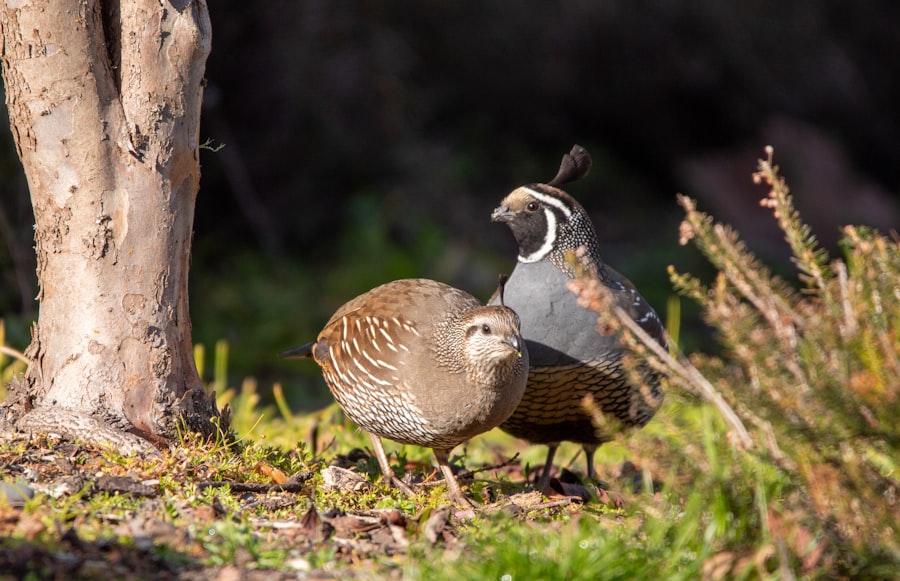
Breeding and raising quail chicks in the garden can be a rewarding experience that allows you to expand your flock and contribute to the sustainability of your garden ecosystem. Quail are prolific breeders that can produce a large number of eggs throughout the breeding season. To encourage successful breeding, it’s important to provide a comfortable nesting area with suitable nesting material such as straw or wood shavings.
Once the eggs have been laid, they should be collected daily and either placed in an incubator or left with a broody hen or artificial incubator. The eggs will typically hatch within 17-18 days, at which point the chicks will require warmth, protection, and access to chick starter feed. Providing a brooder with a heat lamp or heating pad will help keep the chicks warm during their first few weeks of life.
As the chicks grow, they will require access to a larger space with suitable bedding, perches, and access to chick grower feed. It’s important to monitor their growth and behavior closely to ensure that they are healthy and thriving. By providing proper care and attention to the breeding and raising process, you can successfully expand your quail flock while contributing to the sustainability of your garden ecosystem.
Legal Considerations for Keeping Quail in the UK
In the UK, there are legal considerations that must be taken into account when keeping quail in your garden. Under the Animal Welfare Act 2006, all animals including poultry such as quail are protected by law from unnecessary suffering. This means that as a quail keeper, you have a legal responsibility to provide for their welfare needs including access to suitable food and water, appropriate living conditions, protection from pain, suffering, injury or disease.
Additionally, if you plan on selling quail eggs or meat from your garden flock, you may need to register as a food business operator with your local authority under food hygiene regulations. It’s important to familiarize yourself with these regulations and ensure that you comply with any legal requirements before selling any products from your quail flock.
Furthermore, if you plan on keeping more than 50 birds on your property at any one time, you may need to register with the Animal Plant Health Agency (APHA) as a poultry keeper under the Poultry Health Scheme. This registration is designed to help prevent disease outbreaks among poultry flocks by enabling government authorities to trace birds back to their source in case of an outbreak.
By understanding and complying with these legal considerations for keeping quail in the UK, you can ensure that you are meeting your legal responsibilities as a quail keeper while contributing to the health and welfare of your garden flock.
If you’re considering keeping quail in your garden in the UK, you may also be interested in learning about the best ways to keep your chickens warm during the colder months. Check out this helpful article on choosing the right heater for your chicken coop at Poultry Wizard. It’s important to ensure that all your feathered friends are comfortable and well-cared for, so exploring different coop setups and heating options can be beneficial for both quail and chickens alike.
FAQs
What are the benefits of keeping quail in the garden in the UK?
Quail can help control pests in the garden, such as slugs and snails. Their droppings also make excellent fertilizer for plants.
What do quail need to thrive in a garden in the UK?
Quail need a secure and predator-proof enclosure, access to fresh water, a balanced diet, and protection from extreme weather conditions.
What should be considered before keeping quail in a garden in the UK?
Before keeping quail in a garden in the UK, it’s important to check local regulations and obtain any necessary permits. Additionally, consider the space and resources needed to properly care for the quail.
What are the housing requirements for quail in a garden in the UK?
Quail housing should provide protection from predators, adequate ventilation, and enough space for the birds to move around comfortably. It should also be easy to clean and maintain.
What do quail eat and how can they be fed in a garden in the UK?
Quail eat a diet of seeds, grains, insects, and greens. They can be fed commercial quail feed, supplemented with kitchen scraps and foraged plants from the garden.
How can quail be integrated into a garden in the UK?
Quail can be integrated into a garden by providing them with a designated area for foraging, ensuring they have access to fresh water, and using their droppings as fertilizer for plants. It’s important to also consider their impact on other wildlife and the garden ecosystem.
Meet Walter, the feathered-friend fanatic of Florida! Nestled in the sunshine state, Walter struts through life with his feathered companions, clucking his way to happiness. With a coop that’s fancier than a five-star hotel, he’s the Don Juan of the chicken world. When he’s not teaching his hens to do the cha-cha, you’ll find him in a heated debate with his prized rooster, Sir Clucks-a-Lot. Walter’s poultry passion is no yolk; he’s the sunny-side-up guy you never knew you needed in your flock of friends!

